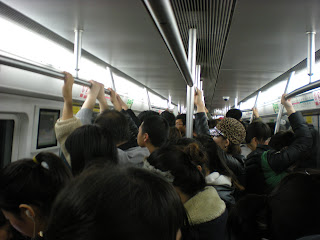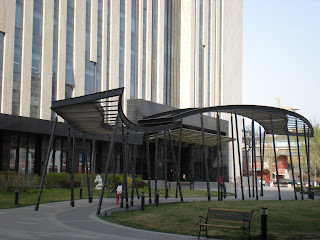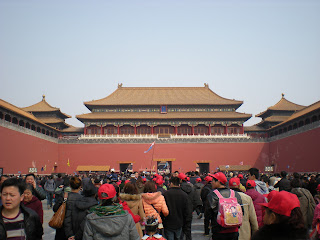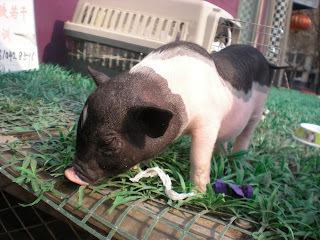There are a number of things that might have kept me from posting about this program until four weeks in. Perhaps I never left Xining, having succumbed to what really was poison in the blood sausage. Perhaps I never got on my flight, considering that the travel agent booked it under the name "MICTHELL." Perhaps I got lost in Beijing's network of subways, hit by a reckless driver, or suffered a nervous breakdown upon realizing that out of the 20 million residents of this city, no one will understand my dirty puns. Or maybe there is no internet in my dorm, or maybe there is but it's just really slow (often true), or maybe there's a national block on Blogger (also true) that I haven't been able to circumvent. But none of these are the reason I have not posted. I have not posted because I am a feckless urchin. Also, because I'm having a good time.
 |
| Here we are, the entire program. With me, of course, taking the picture. |
The Music FSP this year has only five participants. If you're wondering how this did not cause it to be cancelled, I too wonder. Maybe they didn't want to scuttle the ship before its maiden voyage. Sacrifice the virgin, if you will. Near the end of New Zealand, the upcoming Beijing trip was beginning to assume an ominous feel, as the recipients of infomational blitzes dwindled one by one from ten to half that number. Like we five were going to become the protagonists of an Asian horror film, and the other five had a ghostly premonition and dropped.
My first days in Beijing were disorienting, but pleasantly disorienting. It was not so much culture-shock as a reverse culture-shock. Coming from Xining, I experienced a return to certain conveniences of life in a crowded but smoothly developed city. I thought, "Finally, they're speaking my language!" not because they speak English a lot here, but because the Chinese I learned in school is modeled on the Beijing accent. Not the weird stuff they get up to in Qinghai Province. I actually expected my interactions here to be brimming with people eager to practice English, but in fact few adults know much, and college students are often not confident enough to want to use it. Since three of the four other participants on the FSP, plus the director, speak Chinese, group and individual conversations often slip in and out of Chinese and English. Kui (the director) sometimes gets mixed up and speaks Chinese to us, then explains what she told us, in English, to a Chinese person we're talking with.
Our first evening, right off the bat, we had a concert. All of Ligeti's Piano Etudes, which are, as the program title "Devil's Keyboard" suggests, dark and bizarre. Like clocks and shrapnel. But oddly mesmerizing. It was like, "So, you want to go on a music program, huh? Well, take a listen to this."
 |
| Beijing Concert Hall, actually the city's smaller venue since the opening of the National Center for the Performing Arts. |
 |
| Mira's candid shot in the concert hall-way. |
 |
| The pianist received maybe ten bouquets, probably from his students. "He did a good job," said Kui, "but if you know Ligeti's work, you can tell there are some parts where he fudged it." Ever the critic. |
I had had qualms about living in Beijing for ten weeks. I imagined noise, crowds, smog, nature withdrawal, and everybody simultaneously trying to rip me off. Actually, I really like it. Whereas I had pictured gray skies and low visibility over even small distances (indeed what I encountered when here for three days five years ago), the weather is mostly clear. Sunny, if not always warm, but the temperature seems to rise every day.
 |
| Chang'an (Long Peace) Road, the largest road in Beijing, which runs past the Forbidden City. This section near us features a landmark we've dubbed the Shattered Rainbow. |
There are crowds, but not everywhere, and not always. Cities have circadian rhythms, and the flow of people builds and ebbs predictably. (Imagine a time-lapse
Koyaanisqatsi-esque shot of the subway.) In China, I think people hold very tightly to such schedules. I may be generalizing, but at the campus cafeteria at least, most people come within about fifteen minutes of it opening for lunch/dinner, and then almost everyone is gone an hour later. One day it was too crowded so Weijie and I ate our noodles outside in the sun while getting weird looks from many who passed on their way inside. Apparently word spreads, and our director told us that the staff were remarking on what free-thinking Americans we must be and wondering if we were trying to stage a protest.
 |
| A subway platform. They're all pretty much identical, except some have doors to prevent you falling onto the tracks. |
 |
| Chinese has a phrase ren shan ren hai, or "mountains and seas of people." I know why. |
 |
| The mad rush to transfer to the Batong Line. |
I've developed a fondness for the Beijing Subway system. Not having traveled much to cities with subway systems, I think only of the dirty confusion of the NYC underground. Here, though, everything seems so streamlined and simple. There are over a dozen lines, and they go everywhere and all connect. You know where to go because of the color-coded subway maps which are everywhere. It costs you 2 yuan to ride (about 30 cents) no matter how many times you transfer, which you can deduct from a fancy card you swipe. Maybe this is how it works in all subway-having cities, and this is just the first time I've understood it.
The swarms of people have a sort of calming effect to them. As if, confronted with so much of humanity at once, you forget entirely that others can see you or would even have an interest in doing so, tiny piece of the world that you are. Crammed up against strangers on all sides, you don't feel claustrophobic. Instead, for that time in the otherworldly space of the subway car, your personal space extends only to the boundaries of your skin. Everyone is one another.
 |
| I swear this has a sort of feng shui to it. Look at it branching out in the eight directions. |
On the subway map above, I marked the closest spot to campus in black. As you can see, we're pretty near center. Two stops, in fact, from Tiananmen. Beijing has five "rings" (2-6) which refer to concentric roads that run around it. The little blue square route in the middle of the map corresponds to Ring 2, and the bigger blue one to Ring 3. So we're in Ring 2 and can get to pretty much any important location in about 10 to 30 minutes. Or just walk around and find bunches of shops and food stalls. For comparison, the Chinese FSP is in Ring 5. Ohoho.
For reference, here's campus:
 |
| A mosiac on an administrative building. |
 |
| A curvy walkway in front of the classroom building. |
 |
| A courtyard outside the performance hall and cafeteria. |
 |
| A fountain in the center of campus. |
 |
| The Practice Room BUILDING. It has 14 floors. Dartmouth music people, drool. |
Oh yeah, this is the Central Conservatory of Music, the foremost music school in China. We're probably only able to be here because our director went here. There are about 5,000 students, and the campus consists of about what I took pictures of, plus dormitories. Whereas at Dartmouth everything is spread out among quaintly named buildings, here there is
the administrative building,
the library building,
the classroom building.
As far as what I'm actually up to, I have three classes. One is a performance and discussion course, taught by the director, where we go to all sorts of performances throughout the city and then analyze and critique them in class. The second is about Asian music (again just for us five students), taught by a Chinese professor of musicology who happens to also study NORDIC MUSIC at the UNIVERSITY OF HELSINKI and speaks FINNISH. He is me in 40 years, except if I had done music instead of poetry. My third class is one-on-one lessons in a Chinese instrument. I chose the dizi, or bamboo flute.
 |
| Inside the National Center for the Performing Arts, our second home. We're here about once a week. There are six stages within, and...no cameras allowed inside. It's built like a symphony. There's a ceiling with water flowing across. |
Because Kui is a native Beijinger, she's able to take us out to lots of sightseeing spots, well-known and otherwise. And the food! Having spent most of my savings to avoid starvation while in Auckland, I'm amazed at how much this program covers. We not only go to performances about three times a week, but out to eat quite frequently as a group. I call it FSP (Food Study Performances).
 |
| Because you have to go to the Forbidden City. |
 |
| And Tiananmen Square layed out before it. |
 |
| A canal in Beihai Park, northwest of the Forbidden City. |
 |
| Somehow buoyant and also motorized, the boat we road across the lake at Beihai. |
 |
| I think Kui wins most adorable FSP director. (Sorry Igoe...) She's like a penguin! |
 |
| An alleyway Kui was able to navigate us through. |
Sometimes the things we do as a group might be a little hard to justify academically. Occasionally we'll go out to eat, just cuz. One performance was a DJ group at a club, and we accidentally showed up three hours before they started. So instead we went to a bar, had a round of beers, and watched the band which at one point became pole dances, who we continued to watch. Then, cold and desperately hungry, we found the only restaurant nearby that was both open and not hyper expensive. McDonalds. And THEN we went to the club, split a bottle of wine, and danced for an hour a half. Yeah, it's pretty great.
 |
| The lit street of bars, with guys outside pestering to get you inside. As you go down the line, the price of a beer (which you can ask the pester-men to get an overall priciness comparison) goes down, from 35 yuan to more like 15. |
 |
| And on the way... This sign is impressive in using a euphemism none of us had seen before. Usually a sex shop will use the name "Adult Products" or "Husband and Wife Protection." But no, this one is a "Convex Concave" protection shop. The red lights below say "sexy underwear." |
And of course I've explored on my own, usually walking until I get lost, then taking the nearest subway station back.
 |
| Spring blossoms, in Xuanwu Park. |
 |
| I almost felt touristy-American for taking pictures until I saw a number of other people doing the same. |
 |
| The day's newspaper pinned up at the park. |
I decided to get my hair cut one day, so walked along a road until I found a haircutter's. There was one with a pink sign, and inside eight or so fashionably dressed male hairdressers with huge dyed or gelled-up hairdos. There were three levels of haircuts, at 20, 38, or 68 yuan. I asked what the difference between the 20 and 38 was, and was told "it's better." What the hell, I took the 38. And, as an added bonus to getting my hair washed and cut while surrounded by attractive, stylish Chinese guys, they had a pet piglet! Even better! It was just running around outside, and sometimes inside, among the hair clippings.
 |
| Be right back, never leaving. |


























